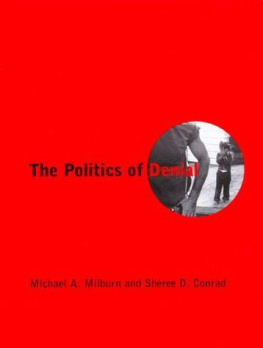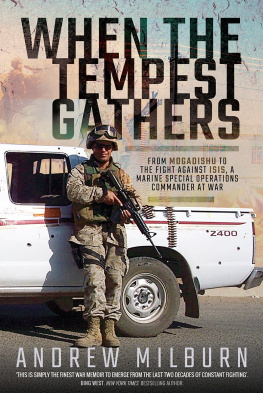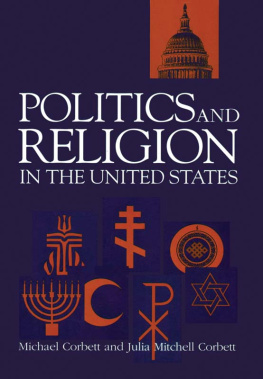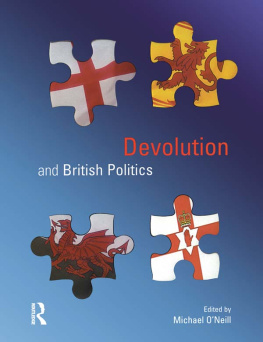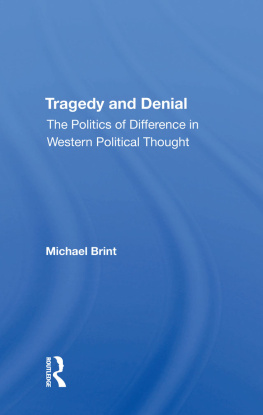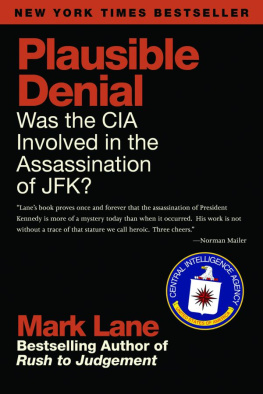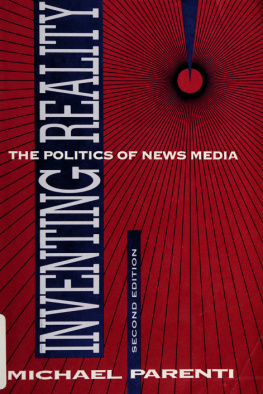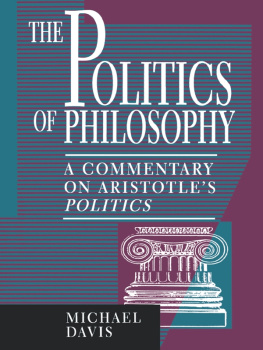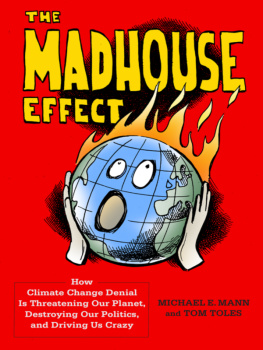Michael A. Milburn - The Politics of Denial
Here you can read online Michael A. Milburn - The Politics of Denial full text of the book (entire story) in english for free. Download pdf and epub, get meaning, cover and reviews about this ebook. year: 1996, publisher: MIT Press, genre: Children. Description of the work, (preface) as well as reviews are available. Best literature library LitArk.com created for fans of good reading and offers a wide selection of genres:
Romance novel
Science fiction
Adventure
Detective
Science
History
Home and family
Prose
Art
Politics
Computer
Non-fiction
Religion
Business
Children
Humor
Choose a favorite category and find really read worthwhile books. Enjoy immersion in the world of imagination, feel the emotions of the characters or learn something new for yourself, make an fascinating discovery.
- Book:The Politics of Denial
- Author:
- Publisher:MIT Press
- Genre:
- Year:1996
- Rating:3 / 5
- Favourites:Add to favourites
- Your mark:
- 60
- 1
- 2
- 3
- 4
- 5
The Politics of Denial: summary, description and annotation
We offer to read an annotation, description, summary or preface (depends on what the author of the book "The Politics of Denial" wrote himself). If you haven't found the necessary information about the book — write in the comments, we will try to find it.
The Politics of Denial — read online for free the complete book (whole text) full work
Below is the text of the book, divided by pages. System saving the place of the last page read, allows you to conveniently read the book "The Politics of Denial" online for free, without having to search again every time where you left off. Put a bookmark, and you can go to the page where you finished reading at any time.
Font size:
Interval:
Bookmark:
1996 Massachusetts Institute of Technology
All rights reserved. No part of this book may be reproduced in any form by any electronic or mechanical means (including photocopying, recording, or information storage and retrieval) without permission in writing from the publisher.
This book was set in Sabon by Graphic Composition, Inc., Athens, Georgia on the Miles 33 System.
Printed and bound in the United States of America.
Library of Congress Cataloging-in-Publication Data
Milburn, Michael A. The politics of denial / Michael A. Milburn, Sheree D. Conrad p. cm. Includes bibliographical references and index. ISBN 0-262-13330-X (hardcover) 1. Political psychology. 2. Political socialization. 3. Child rearing. 4. Parent and child. I. Conrad, Sheree D. II. Title. JA74.5.M55 1996
320.019dc20
96-16100
CIP
This book is dedicated to my parents, Thomas Milburn and JoAnne Milburn M.A.M. and to the memory of David R. Mariani S.D.C.
In the early days of Operation Desert Storm, the networks played incessantly, often to gleeful commentary, an image straight out of a video game: a smart bomb zeroing in on a two-dimensional target. Many Americans were fascinated with the weapon and, admittedly, proud of its precision and the technological prowess it represented. Desert Storm was the good war, the war to make us feel good about America again. Once it began, dissent was almost nonexistent; public opinion polls showed an approval rate of around 90 percent. The news media served as the wars cheerleaders, only much later raising such questions as the United States role in helping create Saddams war machine and the number of Iraqi civilians killed as a result of U.S. actions. Unpleasant truths.
The media are not alone in omitting or obscuring disturbing reality; governments and the military also frequently do so. For more than a year after the morning of March 16, 1968 when U.S. troops outside the village of My Lai massacred, raped, and maimed upwards of four hundred unresisting women, infants, and elderly, the Army managed to cover up the atrocity. When the story of Charlie Company finally hit the media, thirty men were charged but only one was convicted. Lieutenant William Calley, Jr., served four and a half months in military prison. Four and a half months for four hundred murders.
Much of what is eerily inexplicable in occurrences like My Lai, things that dont quite add up or make sense in the media and politics are the end product of a process of denial. Denial, a psychological defense mechanism, is an unconscious mental maneuver that cancels out or obscures painful reality. We hear no evil, see no evil, and hence feel no pain or confusion. We dont have to confront or change things that dont exist; we dont have to examine our motives, intentions, and actions, or those of our government. In a 1994 New York Times Magazine article, Tim OBrien summed up the denial of My Lai, then and now: Evil has no place, it seems, in our national mythology. We erase it. We use ellipses. We salute ourselves and take pride in America the White Knight, America the Lone Ranger, Americas sleek laser-guided weaponry beating up on Saddam and his legion of devils (p. 52).
We are all capable of failing to see or hear the pain and evil around us, or when it becomes glaringly apparent and the evening news shows us corpses tumbling from the back of a dump truck into a mass grave in Rwanda, of failing to appreciate the emotional significance of what we see, of connecting the image with reality, of feeling. We dare not feel the pain or face the potential for evil within us. How many of us could say, with Tim OBrien, I more or less understand what happened on that day in March 1968, how it happened, the wickedness that soaks into your blood and heats up and starts to sizzle. I know the boil that precedes butchery? (p. 53).
Our failure to confront the pain and evil within us, individually and in our national history, guarantees that we will whitewash our motives and justify our actions by vilifying the enemy. And we will act out the violence and tragedy all over again or do nothing to stop it.
The denial that affects our perception of important events like Desert Storm and My Lai also influences attitudes toward important political issues. It affects the political process by letting candidates manipulate voters with hot-button issues that are irrelevant to public policy at best, and destructive at worst. One such hot-button issue is support for the death penalty, which is currently very high in America. As more and more states reinstitute capital punishment, politicians do not hesitate to push the button, in spite of evidence that the death penalty fails to deter crime. A recent survey of American police chiefs found that they did not believe it reduces homicides. Moreover, there are hundreds of documented cases of innocent people wrongly convicted in capital cases.
What purpose, then, does the death penalty serve? Supporting it and implementing it allow people to act out the anger, rage, and helplessness that many of us carry around and to direct these emotions at a target that is clearly and undeniably evil. The death penalty lets us participate in retribution, retribution for the pain we have suffered but do not attribute to its correct source, our childhood.
The entertainment media too play an important role in the interaction between individual denial and the political process. The action-adventure genre, with its melodramatic presentation of good and evil, satisfies the public need for a target the hero can justifiably eliminate, often in grotesquely violent ways. The news media and their emphasis on the dramatic presentation of news events simply extend this view of the world. Thus Saddam Hussein becomes the next Hitler, a man so unquestionably malevolent that any amount of force or cost in civilian lives is justified to eliminate him.
This book is based on a fundamental tenet of political psychology: that childhood experiences can affect the way we view the world and the political perceptions and understanding we develop. In the following chapters, we argue that we fail to see or hear evil because doing so is too painful and challenges the very basis of our assumptions about the world and ourselves. At times, denial is useful; it allows us to withstand traumatic experiences and go on functioning, often quite effectively. This is the positive side of denial. But it also exacts a price. If we deny reality, if we dont feel the pain of what is happening in Bosnia or in the house next door, we dont act, even in the small ways available to us, to change those realities. Instead, we may construct alternatives to reality, fantasy-worlds that further betray our perception of what is really occurring.
Nations, in fact, operate on the basis of such shared reconstructions of reality much of the time. This collective fantasy life is both revealed in politics and supported and maintained by it; our official life as a nation is built on a shared denial of painful realities and the suffering they engender. As children, we learn in our families to deny reality, to repress feelings, and to construct imaginary worlds. As adults, we deny aspects of contemporary reality that remind us of the emotional pain we suffered in childhood: the rage, the helplessness, and the sadness.
Feminists in the 1960s reminded us that the personal is political; the other piece of this realization is that the political is personal. On the national and international levels we work out emotions and dilemmas originating in childhood, at the same time denying that these emotions and dilemmas ever existed. In the process, we set up the conditions in which the next generation will suffer exactly the same pain.
Next pageFont size:
Interval:
Bookmark:
Similar books «The Politics of Denial»
Look at similar books to The Politics of Denial. We have selected literature similar in name and meaning in the hope of providing readers with more options to find new, interesting, not yet read works.
Discussion, reviews of the book The Politics of Denial and just readers' own opinions. Leave your comments, write what you think about the work, its meaning or the main characters. Specify what exactly you liked and what you didn't like, and why you think so.

